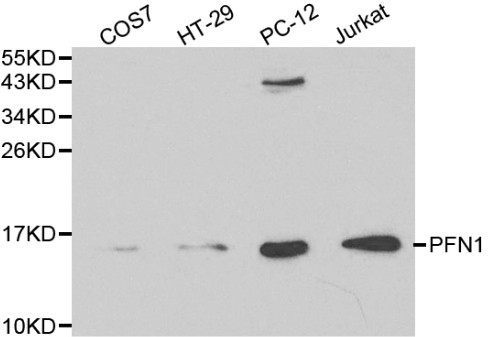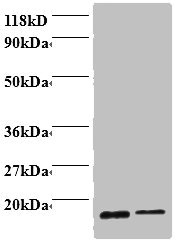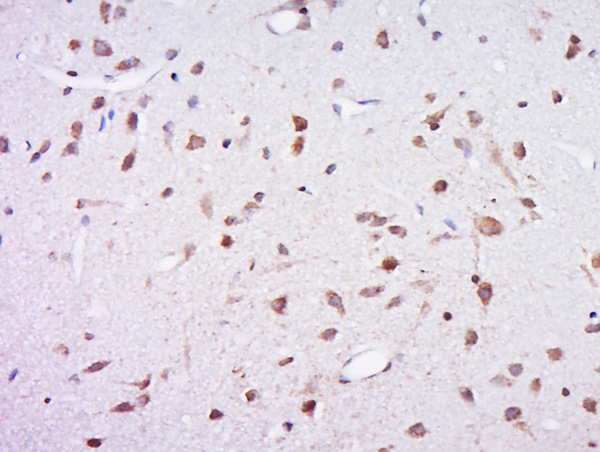anti-Profilin, pAb (IG-706)
AG-25T-0117
ApplicationsWestern Blot, ImmunoCytoChemistry, ImmunoHistoChemistry
Product group Antibodies
ReactivityBovine, Human, Mouse, Porcine, Rat
TargetPFN1
Overview
- SupplierAdipoGen Life Sciences
- Product Nameanti-Profilin, pAb (IG-706)
- Delivery Days Customer10
- ApplicationsWestern Blot, ImmunoCytoChemistry, ImmunoHistoChemistry
- CertificationResearch Use Only
- ClonalityPolyclonal
- Concentration100 ug/ml
- Gene ID5216
- Target namePFN1
- Target descriptionprofilin 1
- Target synonymsALS18, profilin-1, epididymis tissue protein Li 184a, profilin I
- HostRabbit
- Protein IDP07737
- Protein NameProfilin-1
- Scientific DescriptionPolyclonal Antibody. Recognizes human, mouse, rat, pig, bovine and marsupial profilin. Source: Rabbit. Applications: ICC, IHC, WB. Liquid. In PBS containing 1mg/ml BSA and 0.02% sodium azide. Profilin (PFN1) is a ubiquitous small (12-15kDa) phosphoinositide and poly-L-proline binding protein that plays a role in signal transduction pathways and actin filament dynamics. There are two mammalian profilins with similar biochemical properties. Whereas profilin I appears to be highly expressed in most tissues except for skeletal muscle, profilin II is predominantly expressed in brain and at lower levels also in skeletal muscle, uterus and kidney. Profilin is a mainly cytosolic protein with higher concentrations in dynamic membrane areas like the leading edge and ruffling membranes. Profilin binding to PIP2 interferes with PIP2 hydrolysis by soluble phospholipase C-gamma, an inhibition that can be overcome by tyrosine phosphorylation of PLC-gamma. Besides actin monomer sequestration and stimulation of actin nucleotide exchange, profilin can also promote cellular actin filament growth. Profilin is involved in the actin dependent intracellular motility of cytopathogenic bacteria, the regulation of cell adhesion and possibly also in linking the actin cytoskeleton and endocytosis. Profilin has been found to associate with defined complexes containing proteins such as Arp2/3 or the Rho/Rac pathways constituents ROCK-II and HEM2/NAP1. Defects in PFN1 are the cause of amyotrophic lateral sclerosis 18 (ALS18). - Profilin (PFN1) is a ubiquitous small (12-15kDa) phosphoinositide and poly-L-proline binding protein that plays a role in signal transduction pathways and actin filament dynamics. There are two mammalian profilins with similar biochemical properties. Whereas profilin I appears to be highly expressed in most tissues except for skeletal muscle, profilin II is predominantly expressed in brain and at lower levels also in skeletal muscle, uterus and kidney. Profilin is a mainly cytosolic protein with higher concentrations in dynamic membrane areas like the leading edge and ruffling membranes. Profilin binding to PIP2 interferes with PIP2 hydrolysis by soluble phospholipase C-gamma, an inhibition that can be overcome by tyrosine phosphorylation of PLC-gamma. Besides actin monomer sequestration and stimulation of actin nucleotide exchange, profilin can also promote cellular actin filament growth. Profilin is involved in the actin dependent intracellular motility of cytopathogenic bacteria, the regulation of cell adhesion and possibly also in linking the actin cytoskeleton and endocytosis. Profilin has been found to associate with defined complexes containing proteins such as Arp2/3 or the Rho/Rac pathways constituents ROCK-II and HEM2/NAP1. Defects in PFN1 are the cause of amyotrophic lateral sclerosis 18 (ALS18).
- ReactivityBovine, Human, Mouse, Porcine, Rat
- Storage Instruction-20°C,2°C to 8°C
- UNSPSC41116161








